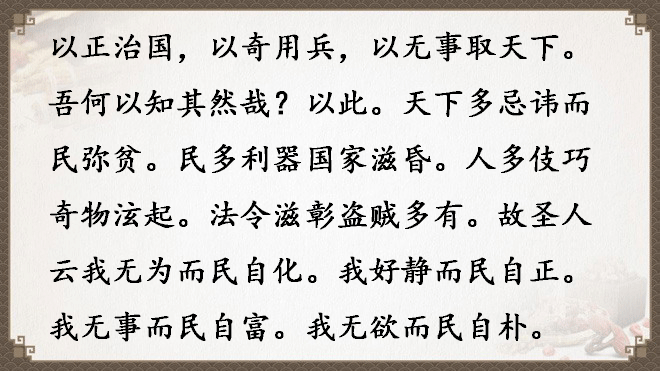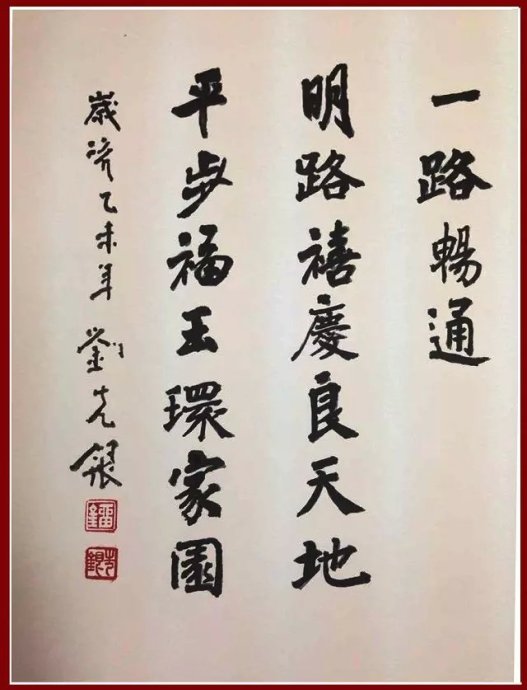
| 57 | 道德經: |
以正治國,以奇用兵,以無事取天下。
吾何以知其然哉?以此:天下多忌諱,而民彌貧;民多利器,國家滋昏;人多伎巧,奇物滋起;法令滋彰,盜賊多有。
故聖人云:我無為,而民自化;我好靜,而民自正;我無事,而民自富;我無欲,而民自樸。
|
| Dao De Jing: |
(The genuine influence)

A state may be ruled by (measures of) correction; weapons of war may be used with crafty dexterity; (but) the kingdom is made one's own (only) by freedom from action and purpose.
How do I know that it is so? By these facts: - In the kingdom, the multiplication of prohibitive enactments increases the poverty of the people; the more implements to add to their profit that the people have, the greater disorder is there in the state and clan; the more acts of crafty dexterity that men possess, the more do strange contrivances appear; the more display there is of legislation, the more thieves and robbers there are.
Therefore a sage has said, 'I will do nothing (of purpose), and the people will be transformed of themselves; I will be fond of keeping still, and the people will of themselves become correct. I will take no trouble about it, and the people will of themselves become rich; I will manifest no ambition, and the people will of themselves attain to the primitive simplicity.'
|


Dao De Jing Chapter 57 - Seddon
Jan 8 at 5:06 AM

57
Rule the state with integrity.
Wage war with cunning strategy;
But win the empire through non-action.
How do I know this?
By this:
The more rules and regulations there are,
the poorer the people become.
The more sharp weapons there are,
the more troubled the state becomes.
The more clever the people become,
the more cunning will their actions
become.
The more that law and order is promoted,
the more thieves and robbers there will be.
Therefore the Sage says:
I do not act and the people transform themselves.
I love tranquillity and the people rectify themselves.
I do nothing and the people prosper by themselves.
I have no desires and the people become like an uncarved block, returning to simplicity by themselves.
第五十七章 [原文]

以正①治國,以奇②用兵,以無事取天下③。吾何以知其然哉?以此④:天下多忌諱⑤,而民彌貧;人⑥多利器⑦,國家滋昏;人多伎巧⑧,奇物⑨滋起;法令滋彰,盜賊多有。故聖人云:"我無為,而民自化⑩;我好靜,而民自正;我無事,而民自富;我無欲,而民自朴。"
[譯文]
以無為、清靜之道去治理國家,以奇巧、詭秘的辦法去用兵,以不擾害人民而治理天下。我怎麼知道是這種情形呢?根據就在於此:天下的禁忌越多,而老百姓就越陷於貧窮;人民的銳利武器越多,國家就越陷於混亂;人們的技巧越多,邪風怪事就越鬧得厲害;法令越是森嚴,盜賊就越是不斷地增加。所以有道的聖人說,我無為,人民就自我化育;我好靜,人民就自然富足;我無欲,而人民就自然淳樸。
[注釋]
1.正:此處指無為、清靜之道。
2.奇:奇巧、詭秘。
3.取天下:治理天下。
4.以此:此,指下面一段文字。以此即以下面這段話為根據。
5.忌諱:禁忌、避諱。
6.人:一本作「民」,一本作「朝」。
7.利器:銳利的武器。
8.人多伎巧:伎巧,指技巧,智巧。此句意為人們的伎巧很多。
9.奇物:邪事、奇事。
10.我無為,而民自化:自化,自我化育。我無為而人民就自然順化了。
[引語]
在二章、五章和十章里,老子已將天道自然的思想,推之於人道,提出了「無為而治」的思想。在本章里,老子以「天下多忌諱,而民彌貧;民多利器,而邦家滋昏;民多智慧,而邪事滋起;法令滋章,而盜賊多有」反證應以「無事取天下」,皆末托「聖人」之言,長言無為之治,章法井然。老子生活的時代,社會動亂不安,嚴峻的現實使他感到統治者依仗權勢、武力、肆意橫行,為所欲為,造成天下「民彌貧」、「國有滋昏」、「盜賊多有」的混亂局面。所以老子提出了「無為」、「無靜」、「無事」、「無欲」的治國方案。他的政治主張在當時不可能被執政者所接受,也絕對沒有實現的可能性。總之,這一章是他對「無為」的社會政治觀點的概括,充滿了脫離實際的幻想成分。但這對於頭腦清醒的統治者為政治民,是會有益處的。
[評析]
先說「以奇用兵」。《道德經》不是兵書,但其中不排除有關於軍事方面的內容,這是我們在前面章節里已經說到的問題。例如本章講「以奇用兵」,實際上講的是軍事問題。在老子的觀念中,用兵是一種詭秘、奇詐的行為,因而在用兵時就要注意想奇法、設奇計、出奇謀,只有這樣才能做到出奇制勝。這表明,老子的用兵之計與治國安邦有截然的區別,即用兵要奇,治國要正。「以奇用兵」實際就是要變化莫測、神出鬼沒。戰爭是一種不正常的現象,是國家政治無法正常運軌時不得已而採取的下策。老子反對戰爭,但戰爭卻不可避免。因此,老子在《道德經》里就不能不提出自己的見解。這個「以奇用兵」之計,不是為昏君、暴君出謀劃策,而是為弱者、為正義之師設想的。
再說第二層意思。老子說「天下多忌諱,而民彌貧;人多利器,國家滋昏;人多伎巧,奇物滋起;法令滋彰,盜賊多有。」這是老子對國計民生的具體思考。胡寄窗寫道:「老子把工藝技巧認定為社會禍亂的原因,他們要求廢除工藝技巧,甚至認為盜賊之產生也是由於工藝技巧的關係」,「可見他們對工藝技巧的深惡痛絕。堅決反對工藝技巧是道家經濟思想的特點。初期儒家並不根本反對工藝之事,只不贊成儒者從事工藝,甚至有時還承認工藝的重要作用。墨家之推重工藝自不必說。戰國後期的儒法各學派,雖鄙視工藝,但尚肯定工藝之社會作用。只有道家才錯誤地把工藝看作是社會禍亂的根源。」「老子反對工藝技巧的這一觀點,非常奇特,與戰國各學派以及戰國以後各封建時期的思想都迥然不同。這一觀點本身不僅是消極落後,而且是反動的。」(《中國經濟思想史》上,第211頁)這種分析雖有其道理,但我們感到還有一些問題需要再作分辨。老子重視「無為」,重視「質樸」,重視「勤儉」,他反對工商的觀點有其指導思想的原因,也有其他方面的原因。客觀地講,老子並不是籠統地、絕對地反對工商,他主要反對的是統治者借工商積斂財貨,過奢侈豪華、醉生夢死的荒淫生活,並不反對老百姓求富,因為在本章中,老子說「我無事,而民自富」。這是很重要的一個證據。籠統地講老子反對工商業的發展,恐怕還要再找一些論據。
No comments:
Post a Comment